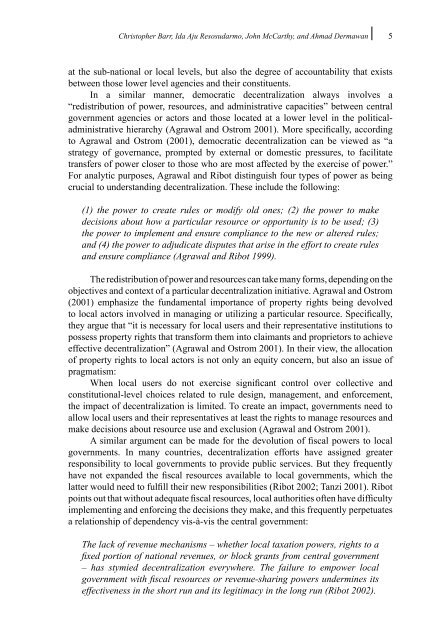Decentralization of Forest Administration in Indonesia, Implications ...
Decentralization of Forest Administration in Indonesia, Implications ...
Decentralization of Forest Administration in Indonesia, Implications ...
You also want an ePaper? Increase the reach of your titles
YUMPU automatically turns print PDFs into web optimized ePapers that Google loves.
Christopher Barr, Ida Aju Resosudarmo, John McCarthy, and Ahmad Dermawan<br />
<br />
at the sub-national or local levels, but also the degree <strong>of</strong> accountability that exists<br />
between those lower level agencies and their constituents.<br />
In a similar manner, democratic decentralization always <strong>in</strong>volves a<br />
“redistribution <strong>of</strong> power, resources, and adm<strong>in</strong>istrative capacities” between central<br />
government agencies or actors and those located at a lower level <strong>in</strong> the politicaladm<strong>in</strong>istrative<br />
hierarchy (Agrawal and Ostrom 2001). More specifically, accord<strong>in</strong>g<br />
to Agrawal and Ostrom (2001), democratic decentralization can be viewed as “a<br />
strategy <strong>of</strong> governance, prompted by external or domestic pressures, to facilitate<br />
transfers <strong>of</strong> power closer to those who are most affected by the exercise <strong>of</strong> power.”<br />
For analytic purposes, Agrawal and Ribot dist<strong>in</strong>guish four types <strong>of</strong> power as be<strong>in</strong>g<br />
crucial to understand<strong>in</strong>g decentralization. These <strong>in</strong>clude the follow<strong>in</strong>g:<br />
(1) the power to create rules or modify old ones; (2) the power to make<br />
decisions about how a particular resource or opportunity is to be used; (3)<br />
the power to implement and ensure compliance to the new or altered rules;<br />
and (4) the power to adjudicate disputes that arise <strong>in</strong> the effort to create rules<br />
and ensure compliance (Agrawal and Ribot 1999).<br />
The redistribution <strong>of</strong> power and resources can take many forms, depend<strong>in</strong>g on the<br />
objectives and context <strong>of</strong> a particular decentralization <strong>in</strong>itiative. Agrawal and Ostrom<br />
(2001) emphasize the fundamental importance <strong>of</strong> property rights be<strong>in</strong>g devolved<br />
to local actors <strong>in</strong>volved <strong>in</strong> manag<strong>in</strong>g or utiliz<strong>in</strong>g a particular resource. Specifically,<br />
they argue that “it is necessary for local users and their representative <strong>in</strong>stitutions to<br />
possess property rights that transform them <strong>in</strong>to claimants and proprietors to achieve<br />
effective decentralization” (Agrawal and Ostrom 2001). In their view, the allocation<br />
<strong>of</strong> property rights to local actors is not only an equity concern, but also an issue <strong>of</strong><br />
pragmatism:<br />
When local users do not exercise significant control over collective and<br />
constitutional-level choices related to rule design, management, and enforcement,<br />
the impact <strong>of</strong> decentralization is limited. To create an impact, governments need to<br />
allow local users and their representatives at least the rights to manage resources and<br />
make decisions about resource use and exclusion (Agrawal and Ostrom 2001).<br />
A similar argument can be made for the devolution <strong>of</strong> fiscal powers to local<br />
governments. In many countries, decentralization efforts have assigned greater<br />
responsibility to local governments to provide public services. But they frequently<br />
have not expanded the fiscal resources available to local governments, which the<br />
latter would need to fulfill their new responsibilities (Ribot 2002; Tanzi 2001). Ribot<br />
po<strong>in</strong>ts out that without adequate fiscal resources, local authorities <strong>of</strong>ten have difficulty<br />
implement<strong>in</strong>g and enforc<strong>in</strong>g the decisions they make, and this frequently perpetuates<br />
a relationship <strong>of</strong> dependency vis-à-vis the central government:<br />
The lack <strong>of</strong> revenue mechanisms – whether local taxation powers, rights to a<br />
fixed portion <strong>of</strong> national revenues, or block grants from central government<br />
– has stymied decentralization everywhere. The failure to empower local<br />
government with fiscal resources or revenue-shar<strong>in</strong>g powers underm<strong>in</strong>es its<br />
effectiveness <strong>in</strong> the short run and its legitimacy <strong>in</strong> the long run (Ribot 2002).

















